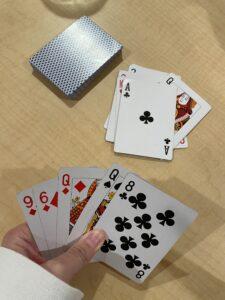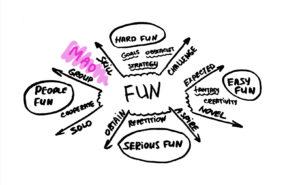Game chosen: Mao

Mao is a social deduction card game that revolves around a secret set of rules which players must figure out as they play. It places a lot of emphasis on social interaction, learning, and players’ ability to adapt to new and changing rules throughout the game. Since my team’s game is loosely based on Mao, the majority of the mechanics are the same—each player is dealt a hand of cards and take turns placing cards down of the same suit/same value, much like Uno; the twist comes where every round, one player gets to institute a secret ‘rule’ every time something happens (i.e. touch your nose every time a 3 is played) and despite not being explicitly told what the rule is, other players are forced to figure out what the rule is by being penalized (draw a card) every time they break the secret rule. There are also a few rules that are always part of the game that are also supposed to be “secret,” at least for new players (i.e. not being able to touch your cards before ‘Mao’ starts the game).

Mao fits squarely in between the ‘fun clusters’ of hard fun and people factor fun, since it is primarily a social game that requires players to use their interpersonal skills and critical thinking to deduce the social status signals from the surrounding players. As such, it primarily falls under LeBlanc’s fun categories of fellowship and challenge. Additionally, because players are allowed to come up with their own rules, there is room for different kinds of fun to be present as well, so overall, Mao does a great job at incorporating different kinds of fun in a simple manner.
However, the game follows a high risk, high reward model in that while players who get the rules quickly feel a strong sense of satisfaction and reward, it is very possible for players to get very frustrated and quit if they are continuously getting penalized and not getting any closer to figuring out the rules. It is also quite a mentally taxing game since players are required to constantly be analyzing their opponents’ actions. As such, a potential improvement to make is adding some way to level the playing field, and keep players from feeling overly frustrated / that the game is too difficult and not worth playing.
Mao differentiates itself from other social games in its genre by its unassuming simplicity, since it only requires players to have a deck of cards and few other people to play with, while simultaneously being able to cause complete chaos very quickly. However, there aren’t really any mechanisms in place to handle abuse or inappropriate behavior, so that is potentially another point of improvement. That is generally the case in social deduction games though—human behavior can be unpredictable and it could just be the job of the surrounding players to ensure that the game experience is safe and enjoyable for everyone involved—so the experience is more self-regulated than mandated.


